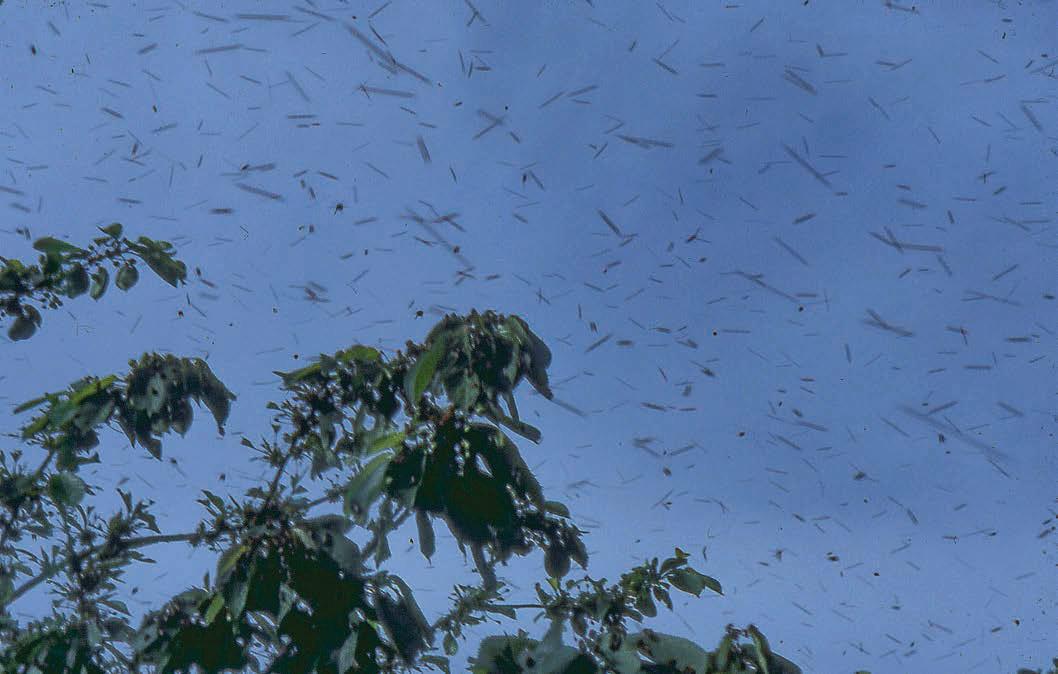Try GOLD - Free
It's important for a beekeeper to really understand why bees swarm
The Country Smallholder
|May 2025
Claire Waring describes the swarming process and the reasons for beekeepers to be able to control it
-

I remember the first time I saw a queen cell in one of my colonies. It sent me into a minor panic, mainly because I hadn't finished the hive I was making at woodwork classes. I completed my inspection and was soon finishing off the roof. Phew! Actually, I needn’t have panicked quite as much because the presence of a queen cell (in the early stages of development) did not mean the swarm was about to leave and fly away. However, what it did teach me was that I needed to be prepared in advance for something I knew was very likely to happen. I had to make sure I had sufficient equipment to deal with swarming preparations by each and every colony. Subsequently I learnt that there are strains of bees that do not swarm invariably but I still needed to be prepared for the worst case scenario.
SO, WHY DO BEES SWARM?
Honey bees are social insects. This means numbers live together as a colony and perform certain tasks that enable that colony to thrive. Bees as individuals undertake functions necessary for their survival, such as eating and drinking. However, the colony can also be regarded as an organism - what is known as a 'superorganism'. Within the colony, we know that the queen is the only one that can lay fertilised eggs, producing worker bees. These females form the bulk of the colony and are adapted to perform the various tasks such as feeding the brood and the queen, cleaning the hive, guarding the entrance and foraging for pollen and nectar, which they turn into honey. The drones come from unfertilised eggs and mate with virgin queens. Thus all the functions normally found in individual animals can be attributed to the colony.
This story is from the May 2025 edition of The Country Smallholder.
Subscribe to Magzter GOLD to access thousands of curated premium stories, and 10,000+ magazines and newspapers.
Already a subscriber? Sign In
MORE STORIES FROM The Country Smallholder

The Country Smallholder
Preventing and Controlling Predators
Poultry are prey animals and, in the UK, there are a wide array of predators that can hunt them. Hugh and Fiona Osborne look at the predators to be aware of and how to guard against them.
7 mins
December 2025

The Country Smallholder
Showing our Turtle Doves some love this Christmas
Helen Moffatt says you can be part of Operation Turtle Dove on your smallholding
3 mins
December 2025

The Country Smallholder
On the third day of Christmas
The famous Christmas carol celebrates \"three French hens\", but what if we gave the verse a smallholder's twist? Cara Wheeldon introduces three festive bantam breeds that bring sparkle, charm, and cheer to coops across Britain this winter.
5 mins
December 2025

The Country Smallholder
Five ideas for inside food growing over winter
Editor and eco-expert Kim Stoddart outlines some more creative ways to bring the outdoors in this winter
3 mins
December 2025

The Country Smallholder
How to enjoy winter pig keeping
Linda Aldous says success is all in the preparation and in your clothing!
5 mins
December 2025

The Country Smallholder
Where next for Britain's smallholding and farming communities as we look to 2026 and beyond
Agricultural journalist, smallholder and editor of Ford & Fordson Tractors Magazine Jane Brooks, joins us for her regular look at the world.
4 mins
December 2025

The Country Smallholder
All dressed up with nowhere to show?
Grant Brereton says there's still cause for optimism with pure breeds
6 mins
December 2025

The Country Smallholder
When small businesses collaborate, things happen!
Angela Williams shows how by working with like minded people, you can create things you thought you could only dream
5 mins
December 2025

The Country Smallholder
Cluckin' around the Christmas tree
'Tis season of peace and goodwill to all hens
5 mins
December 2025

The Country Smallholder
The gentle giant Brahma - big and beautiful
Victoria Roberts BVSC MRCVS looks at a stately, docile chicken with an impressive history
2 mins
December 2025
Listen
Translate
Change font size

